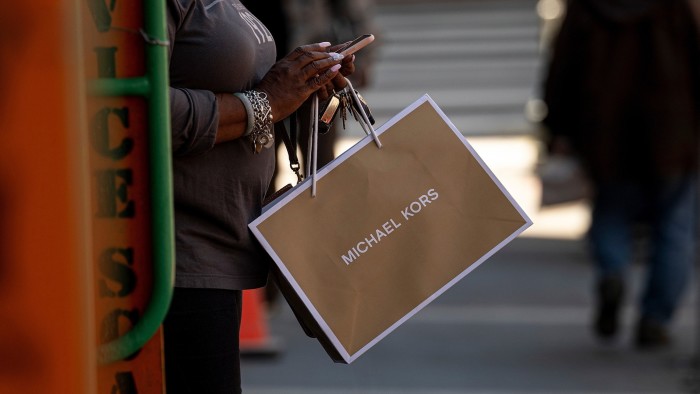Unlock the Editor’s Digest for free
Roula Khalaf, Editor of the FT, selects her favourite stories in this weekly newsletter.
Hours after the $8.5bn deal between the parent company of his fashion brand and the owner of Coach collapsed on Thursday, Michael Kors chief executive John Idol pulled together a last-minute call.
Idol tried to reassure investors that the iconic American label, which had suffered lagging sales, could go it alone.
“We know that we are not performing at the level” the company should be, he said, in his first call with analysts in more than 15 months. While the company waited to be acquired, it had made a series of “mis-steps”. It had not focused on long-term planning and raised prices too quickly.
The cancellation of the deal following pushback from antitrust regulators tosses Michael Kors into uncertain territory at a bleak time for luxury brands globally. Consumers are spending less and certain regions are experiencing crushing economic slowdowns.
“Michael Kors was in decent shape when Tapestry announced they would buy it,” said David Swartz, an analyst at Morningstar. “But its results have dropped off dramatically in the past year . . . The fact that the luxury market is now weak is not helping — it’s making it harder.”
So-called “aspirational shoppers”, or customers who stretch their wallets to buy expensive products, have started to spend less. China, a market that fashion houses had ploughed into over the past decade, has been a particular sore spot.
The deal between Tapestry — the owner of Coach, Kate Spade and Stuart Weitzman — and Capri — the owner of Michael Kors, Versace and Jimmy Choo — fell apart this week after the companies spent months battling antitrust regulators in court.
The Federal Trade Commission argued that yoking the brands together would lead to higher prices and lower quality handbags.
Its cancellation comes three weeks after a federal judge froze the deal ahead of further proceedings before the FTC, which first sued to block it in April. The proposed union had ambitions to create an American rival to European luxury juggernauts like LVMH and Kering.
Until recently, there was still a sliver of hope. The companies were granted an expedited appeals process, and there was already a schedule in place in the coming weeks to fight the court’s decision. But the brands decided to walk away anyway.
“I just don’t understand why they didn’t go the distance here,” said one hedge fund manager, who had bet the deal would close.
Hours after the deal was frozen last month, the stock price of Capri halved, dropping to around $21 per share as investors conceded that the original all-cash offer of $57 per share was doomed. Capri will not receive a break-up fee, but will be reimbursed $45mn for legal costs.
Tapestry is largely considered the stronger business, and Capri has struggled to keep up. Revenue at Michael Kors, Capri’s biggest brand, plunged 16 per cent this year. It lost share in all markets, driven by a 43 per cent drop in China.
Michael Kors himself, the chief creative officer of his eponymous brand, testified during the trial in New York that the company had suffered “brand fatigue” recently. The company’s attempts to re-energise consumers had hit “stasis at this point”, he added.
As Capri charts its path as a standalone business, Idol was candid on the investor call that its current strategy was not working. To right its financial trajectory over the next two years, the company will shut around 75 Michael Kors stores and will renovate 150 others.
Idol also addressed what he considers the largest hurdle in the coming months. “Our biggest concern is China,” he said. “We don’t know how or when the economic situation will stabilise there.” While the company had in the past invested heavily in the country, it will shift focus to North America.
Meanwhile, investors and analysts are already speculating on whether Capri is mulling other transactions or spin-offs as a way to boost its stock. And they all seem to agree that while not imminent, some type of major deal will eventually take place.
“The most shareholder-friendly outcome would be a break-up and sale of the two luxury brands, Versace and Jimmy Choo, which would maximise company EV,” analysts from Bernstein wrote. Splitting the group up would also make more sense for Michael Kors, which would then be a “single-brand stock”.
Since the main concern with the deal between Tapestry and Capri centred on the companies’ respective dominance in handbags, analysts said other types of buyers would escape the same level of antitrust scrutiny. Donald Trump’s incoming administration, which is expected to be softer on business regulation, could also help through a future deal.
Morningstar’s Swartz believes Capri will “eventually be sold as a whole or in parts”, potentially to a private equity group. But first, the company needs to improve its financial situation.
Idol did not dispel those theories on the call with investors.
“We have always been open to conversations with any company that has an interest in any of our assets, as we would always do and always have done,” he said.
Read the full article here

